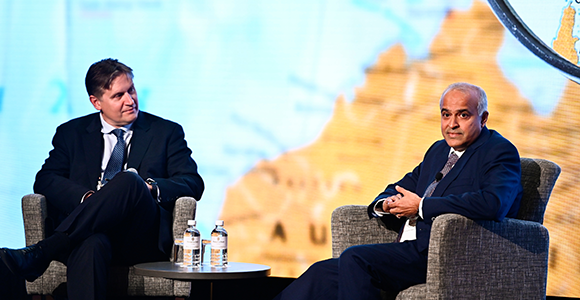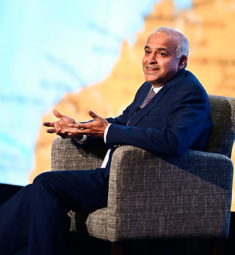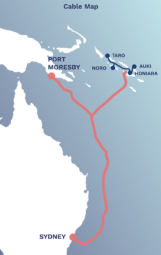Sundar Ramamurthy, Managing Director of Invoc Pty Ltd and former CEO of Bmobile Vodafone and DataNets, explains lower prices are critical if the Coral Sea Cable System is to be a game changer for internet users in Papua New Guinea.

Invoc’s Sundar Ramamurthy and Business Advantage International’s Andrew Wilkins in conversation at the 2019 Business Advantage Papua New Guinea Investment Conference in Sydney. Credit: BAI
We have two cable projects in Papua New Guinea: one that connects Port Moresby to Alotau, Lae and Madang, and then there’s the cable that’s coming from Sydney to Port Moresby, the Coral Sea Cable.
It will be a massive relief for people in Port Moresby in terms of connectivity, but does it mean the rest of PNG is going to benefit from it?
First, we’ve got to get the cable from Port Moresby to other major towns and then across the Highlands. Second, we have a distribution issue because in PNG we have an effective private monopoly.
The telco that I used to run, Bmobile Vodafone, represents only a small part of the market. If they drop the price, they are only impacting a small fraction of internet users. And the company that owns and controls 90 per cent of the market in PNG is not going to blink …
‘You can’t take an essentially ‘free cable’ and put it in a for-profit organisation and then wonder why the price doesn’t go down.’
PNG has to create effective competition and to create effective competition. Hopefully, we’ll get it right this time because, as we all know, governments are not good at retail. We need to find a way, like Bank South Pacific [which was privatised in 2002]. We need to unlock the private sector—imagine PNG with two Digicels!
You can’t take an essentially ‘free cable’ and put it in a for-profit organisation and then wonder why the price doesn’t go down.
Structural changes
So, how do we create effective competition? With the stroke of a pen—and sometimes the stroke of a pen is the hardest because you need to be courageous as a political person.
But if we create the necessary structural changes, then you won’t recognise PNG in two years.
I can say that internet prices in PNG have come down since 1997 but aren’t competitive in the region.
In India, for example, it costs one-tenth of one cent per minute to make a phone call; in PNG it can be up to a kina. We have a long way to go, but I think we just have to be brave and clear about where we want PNG to be. If we do it, we can unlock many things just by fixing a couple of basics.
When I started the internet service provider DataNets, there was a lot of competition but there’s very little now. And that’s a problem all over PNG because if you want to offer services across country then you need to go onto somebody’s mobile towers.
‘I can say that internet prices in PNG have to come down since 1997 but they aren’t competitive in the region.’
Why would Bmobile or Digicel let you on their towers when they’re already competing with you? When you think about it, PNG will end up with a small amount of competition in Port Moresby only because that’s where the market is but not around the country. We need to fix these structural issues.
I was in Kenya two months ago. When you get into a taxi there, the driver says ‘Would you like free WiFi? Just hotspot off my phone.’ In other words, he doesn’t think about it.
If we get to a point where you don’t have to think about the cost of using your telephone to access the internet because it’s so cheap, then things will start to change.
The small and medium enterprises are worried today about getting K20 or K30 to access Gmail and other services wouldn’t have to think about it if it costs just K1.
We need to get it right. Telecommunications can’t be the talking point; it has to be an irrelevance because the sector works for the country and its people.











Speak Your Mind